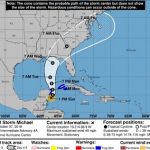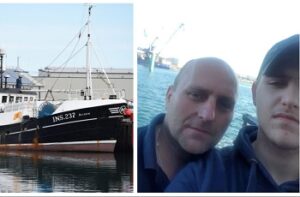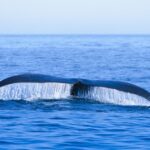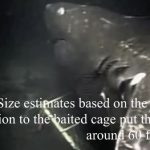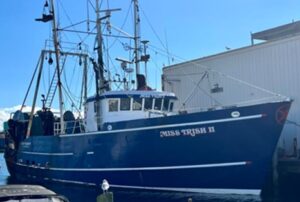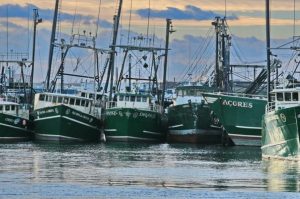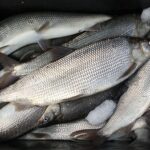Tag Archives: California Department of Fish and Wildlife
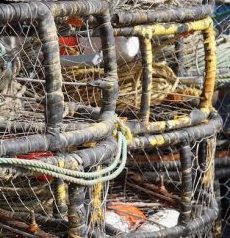
Harbor responds to whale entanglement settlement, give crabbers extra free time to store gear
Recognizing they had the “rug pulled out from under them” due to the outcome of a lawsuit over whale and sea turtle entanglements, Crescent City Harbor commissioners have given the local Dungeness fleet extra time to store their crab pots for free at the port. Commissioners voted 4-0-1 Thursday to allow fishermen to store their pots for free from April 1 to May 15. The Harbor District’s decision comes after the Center for Biological Diversity reached a settlement agreement with the California Department of Fish and Wildlife to end the current commercial Dungeness season statewide three months early on April 15. >click to read<10:21
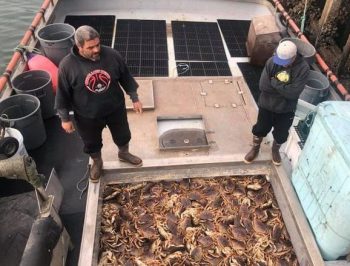
California Crabbers Could Feel the Pain, State Reaches Tentative Agreement With Enviro Group Over Whale Entanglement
The California Department of Fish and Wildlife and the Center for Biological Diversity have tentatively agreed to settle an ongoing lawsuit, which claims that the state’s lack of action in preventing whales from becoming entangled in commercial crabbing lines violates the Endangered Species Act.,,, The Center for Biological Diversity filed the suit in 2017 after a record number of entangled whales were observed off the coast of the Western United States between 2014 and 2016. >click to read<08:55
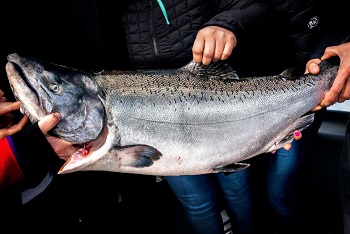
West Coast Fishermen cautiously optimistic for strong salmon season
After three difficult years when Chinook salmon population numbers were down and fishing opportunities were limited, commercial fishermen are hoping that the upcoming season will be better. “What we’re seeing is a better forecast of salmon in the ocean this year than we saw last year,” said Harry Morse, public information officer for the California Department of Fish and Wildlife, following a meeting with about 85 commercial and recreational anglers on Wednesday in Santa Rosa. “We’re cautiously optimistic.” >click to read<10:31

California could be held liable for whale entanglements
The Center for Biological Diversity is hopeful its lawsuit filed over whale and sea turtle entanglements is nearing its conclusion after a federal judge suggested she may find the California Department of Fish and Wildlife liable for the entanglements, a center spokesman said.,,, The two parties have until March 13 to work out their differences and report back to the judge. If no settlement is reached, the judge will issue a finding. >click to read<12:17
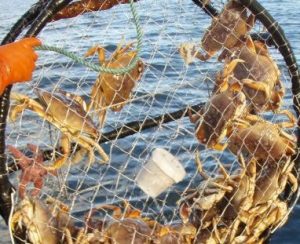
Northern California Commercial Dungeness Crab Season Delay Extended
The California Department of Fish and Wildlife (CDFW) Director Charlton H. Bonham announced an additional and final 15-day delay of the northern California commercial Dungeness crab season. Pending possible closures due to elevated levels of domoic acid, the season is now set to begin on Jan. 15, 2019. Quality tests as prescribed by the Pre-Season Testing Protocol for the Tri-State Coastal Dungeness Commercial Fishery were scheduled to occur this week, but rough ocean conditions prevented vessels from safely deploying and retrieving traps. This protocol requires that tested crab achieve a meat recovery rate to ensure that crab are ready for harvest. Previous quality test results from Dungeness crab collected on Nov. 3 and Dec. 4 indicated that crab did not have enough meat. Without any passing test results from these areas, the Director continued to delay the season to Jan. 15, the final date a quality delay can be set to occur. >click to read<

McGuire tackles crabbing, whale entanglement issues at committee hearing
“Domoic acid levels in the Pacific this year have been trending upwards, especially in Northern California,” McGuire said at the start of the hearing, held at Aquarium of the Bay in San Francisco. “Humboldt, Del Norte and southern Oregon have appeared as hot spots along the West Coast.” And while the 2015 crabbing season and spike in entanglements was one of the more talked-about issues during the hearing, McGuire added, “We do not expect another statewide closure like we saw in 2015.” This year alone, there have been 27 confirmed whale entanglements. That’s down from the 71 reported in 2016, but it is still more than double the state average.>click to read<10:31
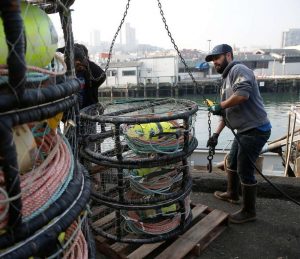
California seeks plan to protect whales and Dungeness crab fishery
Whales are a big deal, literally, as the most majestic, largest animals swimming off our shore. What the California Department of Fish and Wildlife has done in the past several years with our partners to prevent whale entanglements in fishing gear is a big deal, too.,, That is why our department is taking actions to protect the whales and our prized crab fishery. The department is working to create a conservation plan that will analyze the effects of crab fishing on whales, identify steps to minimize the risk of whale entanglements in the crab fishing gear, secure funding to implement the plan, and submit it to the federal government for needed approval. >click to read<12:14
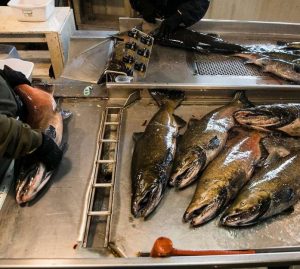
Salmon surge: Habitat improvements paying off on one California river
Near record numbers of chinook salmon are surging up the Mokelumne River, marking the second large spawning year in a row and signaling to fisheries biologists that habitat improvements in recent years are paying off for fish and the people who eat the pinkish delicacies.,,,It is expected to be the best two-year run on the river since records started being kept in 1940, a significant accomplishment given how dismal salmon returns have been over the past three years in virtually every other waterway in California, including the Sacramento River, which last year saw its lowest returns in eight years. >click to read<08:58

Commercial Dungeness crab season delayed in Northern California
California Department of Fish and Wildlife Director Charlton H. Bonham issued a memo Tuesday delaying the Northern California commercial Dungeness crab season due to poor crab meat quality test results. The delay includes Fish and Game Districts 6, 7, 8 and 9 (Mendocino, Humboldt and Del Norte counties). The northern Dungeness crab fishery is delayed until 12:01 a.m. on Sunday, Dec.16, pending another round of test results tentatively scheduled for Dec. 1. If these results indicate good quality, the fishery will open and be preceded by a 64-hour gear setting period that would begin no earlier than 8:01 a.m. on Thursday, Dec. 13. >click to read<12:13
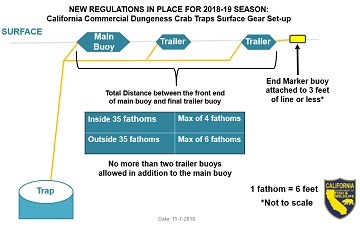
New regulations for commercial Dungeness crab fishery now in effect
The California Department of Fish and Wildlife enacted new regulations to reduce the risk of marine life entanglements in commercial Dungeness crab fishing gear. These regulations became effective on Oct. 30, 2018, and will be in place for the upcoming 2018-19 commercial Dungeness crab season. The new regulations allow no more than two trailer buoys to be used at the surface and establish a maximum distance between the front end of the main buoy to the tail end of the last trailer buoy depending on the depth that a trap is deployed. >click to read<11:34
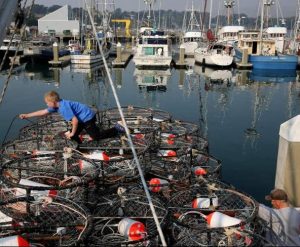
Counting down to Thanksgiving crab? It won’t be long now
This year, state regulators are opening the main fishery on time but only as far north as Bodega Head while they await a second round of test results from sample crabs taken off the mouth of the Russian River, where a single shellfish collected late last month had elevated levels of domoic acid, a naturally occurring neurotoxin. The six-crab sample taken a week later tested well within federal limits for the algae-related substance. A second consecutive round of tests is needed before the area can be declared clean and the rest of the Sonoma Coast opened to commercial crabbing. >click to read<13:01

California Dungeness crab season faces delays in parts of state
The opening of the commercial Dungeness crab season has been delayed until at least Dec. 1 in the waters north of Bodega Head State Marine Reserve to the Sonoma/Mendocino county line because of elevated levels of domoic acid, the California Department of Fish and Wildlife announced today. The commercial fishery south of this area will open as scheduled Thursday, however. >click to read<10:51

Fisheries Omnibus Bill of 2018 – California Lawmakers Act to Protect Whales, Turtles From Entanglement
The California Senate yesterday sent legislation to Gov. Jerry Brown to sign that requires the California Department of Fish and Wildlife to adopt regulations to prevent whales and sea turtles from being entangled in commercial Dungeness crab lines. West Coast entanglements have skyrocketed in recent years. California commercial Dungeness crab gear is responsible for the majority of entanglements where the gear could be identified, entangling at least 35 whales from 2015 to 2017. Senate Bill 1309 responded to the crisis by requiring regulations by November 1, 2020, and directing the department to restrict fishing as needed until then to prevent a significant risk of entanglements. >click to read<20:33
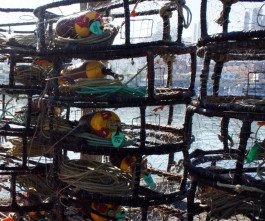
Crabbers to get federal disaster relief
The California Department of Fish and Wildlife (CDFW) has proposed a spending plan for federal Dungeness Crab disaster relief funding after taking input from fishermen, processors and charter boat operators. The state’s 2015 to 2016 commercial Dungeness and rock crab seasons were declared as fisheries disasters after being drastically curtailed due to algae blooms and the domoic acid toxin they produced. Approval of $28.8 million in federal relief funding was gained last June, with most of it covering Dungeness losses. Based on guidelines from the federal National Oceanic and Atmospheric Administration (NOAA) and feedback from industry stakeholders, CDFW proposes that 89 percent of the relief funding be spent on “direct payments” to commercial fishermen, buyer/processors and sport charter boat operations. >click to read<19:31

North Coast crabbers haul in above average catch in 2017-18 season worth $42 million
The North Coast had a significantly improved Dungeness crab season this year, hauling in 14.3 million of the 19.4 million pounds of Dungeness crab landed in California so far this season, according to preliminary state data provided to the Times-Standard on Tuesday. While there were a few obstacles, Trinidad crab fisherman Mike McBrayer said Tuesday that he had a much improved season thanks to a great crew and good weather that permitted him to get out on the water more days. “And there were crabs, and that’s always a good thing,” McBrayer said.>click to read<15:47

Crescent City’s annual crab haul larger than average
Despite a late start to the season, commercial fishermen brought slightly more Dungeness crab to the Crescent City Harbor than in previous years, according to numbers from the California Department of Fish and Wildlife. While this makes for increased revenue at the harbor, which collects 2 cents for every pound brought to its docks, Rick Shepherd, president of the Del Norte Fisherman’s Marketing Association, said commercial crabbers were paid less than last year. “I think one of the problems that I witnessed was there was a larger number of boats that participated here and so I think the actual amount of crab each boat caught was less,” he said. >click to read<09:39
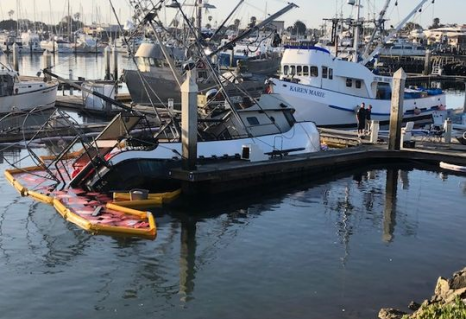
Sinking fishing boat salvaged at Ventura Harbor
Crews salvaged a commercial fishing boat that was sinking at Ventura Harbor early Saturday. The Ventura Harbor Patrol was notified at 2:10 a.m. about a boat that had started sinking in its slip at the Ventura Harbor Village Marina, 1583 Spinnaker Drive. Patrol officers responded and requested assistance from the city of Ventura Fire Department, the Coast Guard and the California Department of Fish and Wildlife. An oil containment boom was deployed around the vessel to minimize the spread of its 1,300 gallons of diesel fuel. >click to read<19:46
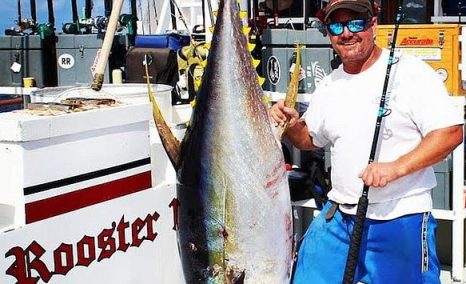
Boat busted
On May 22, the California Department of Fish and Wildlife posted on their Facebook page that read in part that in September of 2017, their officers made a “significant over-limit bust on the captain of the commercial passenger fishing vessel, Red Rooster, out of San Diego Harbor. “…. the vessel’s captain (Christian Andrew Cates), plead guilty to possession of fish illegally taken outside the state and importation of fish without declaration. He was sentenced to five days of public service work and $40,000 in fines, $37,000 of which has already been paid to the court.” >click to read<12:04
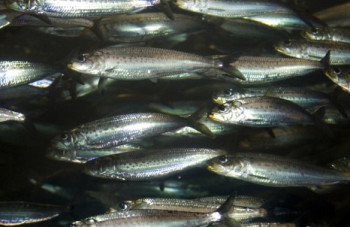
California Wetfish Producers Association: Sardine Fishery Collapse Latest Fake News
This Sunday, April 8, the Pacific Fishery Management Council is meeting in Portland to debate the fate of the West Coast sardine fishery, after the 2018 sardine stock assessment estimated the biomass has declined by 97 percent since 2006. According to the California Wetfish Producers Association, the only problem with that finding is it belies reality. “Fishermen are seeing more sardines, not less, especially in nearshore waters. And they’ve been seeing this population spike for several years now,” said Diane Pleschner-Steele, executive director of the California Wetfish Producers Association (CWPA). “This stock assessment was an update that was not allowed to include any new methods and was based primarily on a single acoustic survey,,, >click to read<21:15
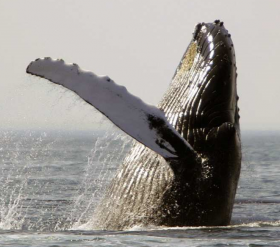
Whales and fishermen caught in turf war over California’s coast
As rising ocean temperatures move their food supplies closer to shore, a staggering number of migrating whales have been forced into the path of California’s crab fishing fleet — and the confrontations have increased dramatically over the last five years. State agencies have tried and failed to keep whales out of crab gear, prompting one nonprofit to take matters into its own hands.,, Some fishermen see this lawsuit as another nail in the coffin for California’s Dungeness crab fishery. >click to read< 09:20
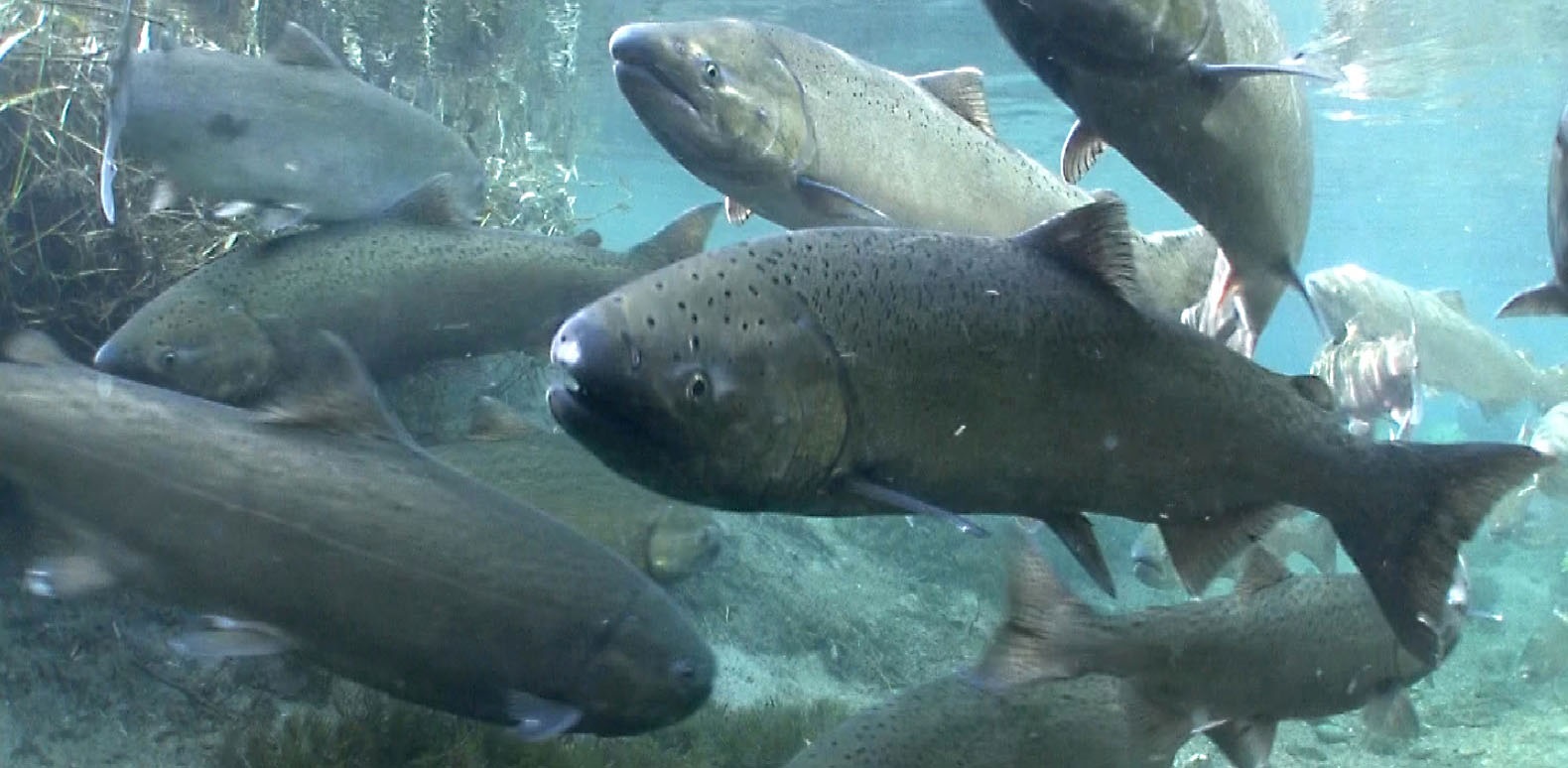
California’s Salmon Industry Set to Take Another Hit
Fisheries managers will impose the toughest restrictions on California’s salmon harvest in nearly a decade, hobbling the billion-dollar industry that depends on it. This year’s fall salmon run is estimated to be only a quarter of normal on California’s Sacramento River, due mostly to drought conditions and warmer ocean temperatures. As a result, officials at the Pacific Fishery Management Council last week moved to cut the commercial season by as much as a third of its standard length. >click to read< 10:42
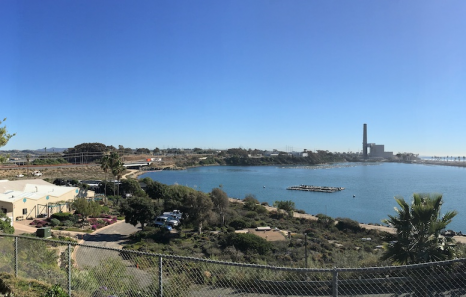
Carlsbad Fish-Breeding Program Is a Mess, Report Confirms
For years, the state has paid the Hubbs-SeaWorld Research Institute to breed and release white seabass into the ocean. The goal was to spawn enough new fish to help overcome threats from pollution, overfishing and habitat destruction. But years of experimental fish breeding at Hubbs’ Carlsbad hatchery have done nearly nothing to help restock the ocean, according to a new report by an independent panel of scientists. Instead, the program has potentially threatened the health of the wild white seabass population. The state has spent $22 million on the program over the past 15 years. In recent years, that’s amounted to about $12 per fish released into the ocean. >click to read< 08:49

California: Commercial crabbing on hold
Although they’re not calling it a strike, crabbers say they will hold off on fishing until next week so plants and the boats can “get cleaned up.” Randy Smith, owner of the fishing vessel Mistasea, said seafood buyers have begun offering $2.50 per pound of crab brought in, 25 cents less than what was being offered when crabbers began fishing on Feb. 5. But, Smith, who attended a meeting of the Del Norte Fisherman’s Marketing Association on Friday, said seafood buyers have told fishermen that they won’t take any more crab until Monday or Tuesday. “It’s kind of confusing whether they don’t want us fishing until then, but they didn’t want a big glut of crabs,” >click to read< 11:48
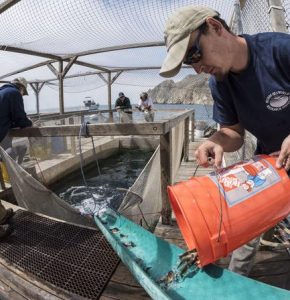
$40 Million Later, A Pioneering Plan To Boost Wild Fish Stocks Shows Little Success
Back in 1983, it seemed like a good idea. Local populations of California white seabass, a favorite among recreational and commercial fishermen, prized for its mild, tender, flaky white flesh, were declining.,, But as is often the case, things weren’t so simple. Some 35 years and nearly $40 million later, the future of the Ocean Resources Enhancement and Hatchery Program (as it’s formally called) is in jeopardy: The first formal scientific evaluation has concluded that the program had increased white seabass populations by less than 1 percent — a stunningly low success rate. >click to read< 09:52
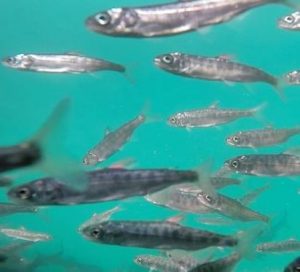
For first time in 60 years, spring-run Chinook salmon reproduce in San Joaquin River
As work to restore the San Joaquin River continues, scientists are seeing promising signs that salmon can thrive in the river as hatchery fish reach new milestones. A recent breakthrough came in fall 2017, when spring-run Chinook salmon created their nests, called redds, in the deeper and colder parts of the river below Friant Dam. The fish successfully spawned, laying eggs that incubated and hatched into tiny fry as the sexually mature fish died, part of the species’ unusual life cycle. >click here to read< 15:16

Commercial crab season to open Monday but local crabbers want another test done
Following several delays, the commercial Dungeness crab fishing season for Humboldt, Mendocino and Del Norte counties is opening Jan. 15, the California Department of Fish and Wildlife announced Wednesday.,,, Trinidad commercial crabber Craig Goucher said there are currently no plans to set gear Jan. 12. Instead, he said, local crabbers plan to wait until Jan. 15 to drop gear. “We’re going to set some test gear out and get it processed and determine what the pick out is,” he said Wednesday afternoon. “We can legally get that sample on the 15th.” >click here to read< 09:34
Negotiations could further delay crab catch – Columbia crab fishermen can start placing their pots in the ocean Friday morning, but first they have to settle on a price with processors. >click here to read< 10:17
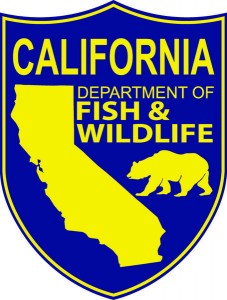
Commercial Dungeness Crab Season to Open in Northern California
The northern California Dungeness crab fishery in Mendocino, Humboldt and Del Norte counties will open 12:01 a.m. on Monday, Jan. 15, 2018. The opener will be preceded by a 64-hour gear setting period that will begin at 8:01 a.m. Jan. 12, 2018. California Department of Fish and Wildlife (CDFW) Director Charlton H. Bonham had delayed the season a total of three times after crab quality test results in November and December indicated that crab were not ready for harvesting. Jan. 15 is the latest the Director can delay the season due to quality testing. >click here to read<21:23

Northern California Commercial Dungeness Crab Season Opener Pushed Back to Dec. 31
The director of the California Department of Fish and Wildlife (CDFW) has announced an additional 15-day delay for the upcoming commercial Dungeness crab season, based on the results of another round of pre-season quality testing conducted on Dec. 5. The tests continued to show that Dungeness crab are not yet ready for harvesting. The delay affects Fish and Game Districts 6, 7, 8 and 9 (Mendocino, Humboldt and Del Norte counties). The season in these districts is now scheduled to open on 12:01 a.m. Dec. 31, 2017, to be preceded by a 64-hour gear setting period that would begin no earlier than 8:01 a.m. on Dec. 28, 2017. click here to read the press release 19:32

Commercial Dungeness Crab Season in Northern California Delayed Due to Crab Quality Testing
Due to poor crab meat quality test results conducted at the beginning of November, the Director of the California Department of Fish and Wildlife (CDFW) has issued a memo delaying the opening of the commercial Dungeness crab season in Fish and Game Districts 6, 7, 8 and 9 (Mendocino, Humboldt and Del Norte counties) for a minimum of 15 days until Dec. 16, under authority of Fish and Game Code section 8276.2. Crab quality tests ensure that crab are filled out enough prior to harvesting and follow the testing guidelines established by the Tri-State Dungeness Crab Committee that is overseen by the Pacific States Marine Fisheries Commission. click here to read the press release 21:15
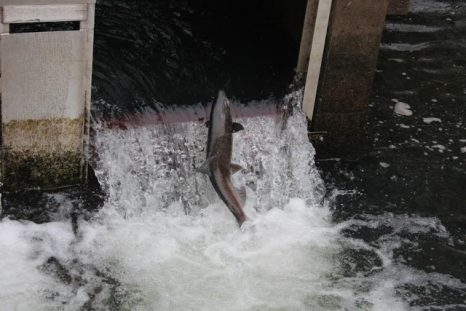
Record Chinook Salmon, Steelhead Returns Reported on Mokelumne River
For many years after Camanche Dam was built, the Mokelumne River, a major tributary of the San Joaquin River and the Delta, hosted small runs of Chinook salmon. The historic runs of steelhead after the construction of the dam averaged only 100 fish and no steelhead returned to spawn many years. But both steelhead and salmon runs have rebounded in recent years, due to a number of factors. In welcome good news for Central Valley salmon populations, the California Department of Fish and Wildlife (CDFW) and the East Bay Municipal Utility District (EBMUD) report record fall spawning returns of Chinook salmon and steelhead to the Mokelumne River, a tributary of the San Joaquin River.,, The hatchery has received 13,799 adult salmon to date—compared to 4,129 at this point last year—and is expected to break the record return of 18,000 in 2011. click here to read the story 20:33

































